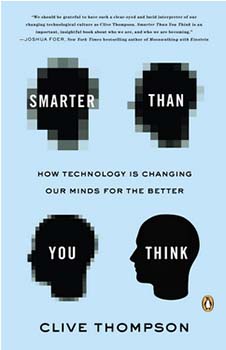Three cheers for the podcast On the Media because they interviewed the author who’s little summary/arguments sold me on his book.
I’ll start from the easy angle. Today’s teenagers. They’re often seen on their mobile devices (often cell phones), staring into them, sending text messages, pictures, so on. My niece Anna doesn’t even read e-mail so don’t even bother expecting an answer. What’s the common response from older people, including myself? It just shows how rude they’ve become. These things are turing them into morons. So on and so forth. In their defense, when I was a kid, we often could be found burying our faces into the old Mattel hand-held sports games while waiting in queue. We heard the same rhetoric and responded with standard adolescent eye rolling. However, Thompson picks apart the age-old diatribe stating how a new gadget will make us dumber.
One of the earliest critics against technological innovation, in this case, the written word, was Socrates (allegedly). The famous philosopher felt that writing down stuff froze the facts, argument, whatever; writing created a dangerous state of permanency. We snicker now but the means to write have been readily available for at least a couple centuries. Imagine how our descendants (if they’re not dying through climate change) will laugh at us when they read about our rants over the newer tools we have. I think they’ll ridicule our lack of formalized etiquette. Thompson’s point is over time, we humans find new ways to integrate, improve and make these developments ubiquitous, thus making the past/present fears seem silly. A couple strong examples: centaurs, a human and a computer teaming up to play chess instead of against each other; and how we have delegated certain memory functions to gadgets. Do you remember anyone else’s phone number anymore? In addition, he gave me more ammo to prove the existence of “institutional memory,” which managerial types hate. They blather on about collaboration yet believe through online/Web tools, all information workers can do the exact same work consistently. The same goes for the shitty, no-cubicle/office movement. There are time when people need to be isolated to tackle a problem before they should collaborate, aka, there is such as thing as too much collaboration. What I call, thinking by committee.
He’s not a complete cheerleader neither. Past declarations are brought up that didn’t come true: war would end thanks to the telegraph, radio and airplanes; and then there’s the healthy skepticism on how FaceBook didn’t cause the Arab Spring, it helped, it just wasn’t the instigator and enabled a rather organized dissident movement. Another scary fact. China may have the Great Firewall to block out what they don’t want their citizens to see/know (Tibet, Tiananmen Square) which is mostly successful at keeping people in line. Scarier regimes leave the Internet even more open to arrest dissidents at random as Azerbaijan does, thus they’re more effective than the Chinese. With the latter, it reminds me of how the US government under Dick Cheney will go too far.
I highly recommend Thompson’s book. My reservations regarding privacy, incivility and rudeness remain. I now see some upsides and I’m grateful he wasn’t as sold on all the bullshit being peddled on how all these “game changers” are going to make the world better while making a few particular assholes wealthier.

